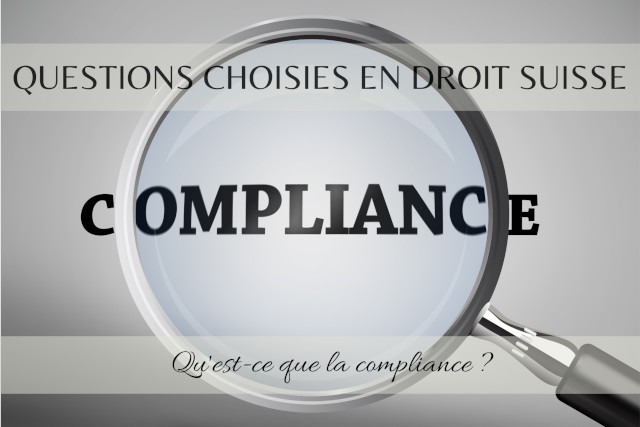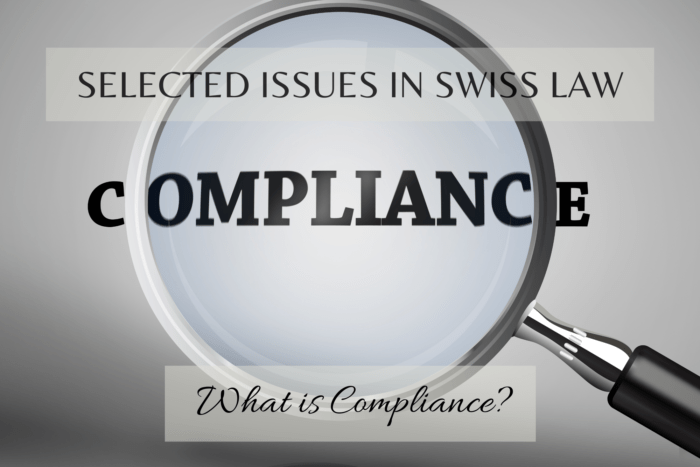

Vous pouvez lire la version française ici.
The purpose of this series of articles is to explore a variety of current matters relating to different legal fields that are of interest to the general public.
In this article, we focus on “Compliance” in the area of the Swiss financial markets.
In general, compliance is the ability to function according to a set of rules.
The framework of a company that operates in the Swiss financial markets is regulated by a lot of international and national acts, ordinances and codes of conduct.
The Swiss regulator for supervision of the financial markets is called FINMA (“Finanzmarktaufsichtsgesetz”, “Autorité fédérale de surveillance des marchés financiers”). The FINMA authorises companies to operate in the Swiss market and verifies that they comply with the rules.
Corporate compliance officers are the first point of contact for day-to-day regulatory matters with FINMA.
Corporate compliance teams implement, maintain and review compliance with both external and internal directives imposed upon the activity of the company.
The external rules and regulations can include international treaties, federal acts and ordinances, various laws and regulations, codes of conduct, standards, and principles.
The internal procedures are in-house policies and systems installed in order to comply with the external rules.
The compliance department must fulfill various functions.
Firstly, it detects compliance problems using a series of controls, monitoring, surveillance and reporting routines to ensure the staff adheres to internal rules and does what it must do to remain compliant.
It must also dispense regular training and assessments. It is responsible for maintaining up-to-date internal procedures and policies. In order to adhere to internal compliance rules, compliance teams must provide the staff with a compliance manual relevant to the jurisdiction of the entity they work for. The staff must also be appropriately trained and competent in order to perform their role.
Moreover, compliance officers are responsible for the resolution of compliance problems as they occur.
Finally, they provide advice to the business on any rules and controls.
There are many business areas that must comply with regulatory rules, in particular regarding financial crime or internal organisation.
The staff must exercise due care and diligence to ensure they avoid any actions constitutive of a breach of market integrity. Employees must avoid any market abuse, manipulation or inside dealing.
In addition, are also forbid conflicts of interest, or any business situation that has the potential to place the interests of one client above another, or place the firm or its employees ahead of the clients.
The company must as well keep away from money laundering and financial crime. In order to do that, it must implement internal procedures to ensure compliance with international and Swiss laws and requirements against it.
Mainly, employees must follow best practice guidelines as a way to steer clear of breaches.
Compliance tracks any regulatory breaches, errors and complaints, and audits are conducted to ensure compliance with the latest regulations.
On an international basis, the UN, EU and US impose sanctions and measures against a country, a regime or a person who is in violation of an international regulation.
At the company level, breaches of policies can lead to disciplinary action, or if considered gross misconduct, lead to immediate dismissal.
The compliance unit supports the business in the goal of adhering to all the rules and controls and seeks to reduce system risk and financial crime.
Compliance regulations are also there to ensure that the markets are fair, efficient and transparent.
Regulatory compliance plays an essential role in helping to preserve the integrity and reputation of the firm and to maintain investors’ trust and confidence in order to guarantee the continuity of the business and to protect them.
Being compliant is a collective responsibility shared between the board of a company, the compliance unit and all other staff members who must advise compliance with all notifiable events, regulatory breaches and operational risk events.
Articles by the same author:
Questions choisies en droit suisse – Révision du droit des succesions
Sources:
Federal Act on the Swiss Financial Market Supervisory Authority, 22 June 2007 (FINMASA)
Federal Act on Collective Investment Schemes, 23 June 2006 (CISA)
Federal Act on Combating Money Laundering and Terrorist Financing, 10 October 1997 (AMLA)
Image: Canva / Depositphotos